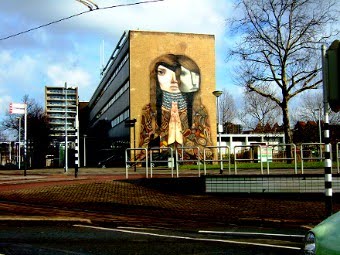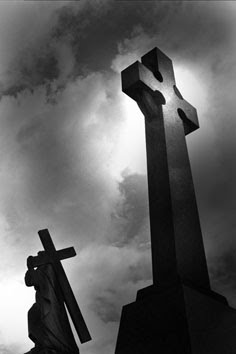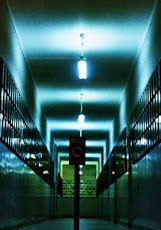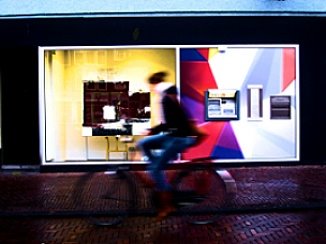An
Essay on Europe. By Martin Nangle
“Jews
know why this wall was built,” he said. I looked at him. This young
man who had engaged a conversation was most likely the only person on
the Berlin tram that crisp '89 November morning who thought as such.
I
was there as a photojournalist enjoying the electric buzz of the
fall. A generation removed from the European War, I did not share his
dangers of German reunification.
It
was the end of history. No not history. The end of “A” history.
History does not stand still, it comes to a concurrent conclusion by
sowing the seed for a new one.
It's
remarkable to experience the birth of ones own history and the
closing of the previous one started by my grandfather's generation.
He was captured at the Somme in 1916 and sat out that conflict on a
farm in Southern Germany. Lucky for him and lucky for me. I suppose.
What
my mind discovered, walking the streets of Berlin over the following
days, was a simple description of one's own history. It belongs to a
couple of generations, if it is not your story then it is not your
responsibility and getting involved is mostly a matter of choice.
What
I didn't consider was the man's statement on the tram. That came
later during my tours of post Soviet Empire, The Levant, Yugoslavia
and Brussels.
Declaration
of the European Union in '92 was major part of the new history. We
were the original “Big society, all in it together, united in
diversity.” We had purpose and a future.
But
times following the declaration soon grew dark and weary. Eastern
Balkan Europe was a bleak outpost feeding off EU handouts and
benevolence. Bosnia showed the true nature of Europe's sinister past
left to me by my grandfather.
Europe
was anything but an organically grown community embracing a long
awaited family reunion. In fact it was the exact opposite. It
resembled more a quarrelsome prison of inmates motivated by envy,
self interest and often loathing for others. Only, to come together
when faced with a mighty external threat to survival and order.
It
was then I experienced the law of raw naked corruption as a way
getting things done. Every operation including meals, road trips and
overnight stays factored in the backhander and the rip off. It would
have been tedious had I not been on expenses.
My
respect then for this type of European leadership was not very high.
However it was possible to still be enjoying the daily ambience of
New Europe while keeping one eye on how the mysterious European Union
was dishing out the funds. It looked as if the West at least had
realised Europe's chance was acceptance of a democratic shared space
for very different social groups and cultures. Dominance was to
become a negative policy for modernity. Mankind forever weak and
cruel needed new moral guidance. Human existence was a simple freak
of nature, society a total human creation. God is just not part of
it.
 |
| At the heart of Europe's future, Germany 2012 is split on which direction Europe should take. A time for agreed unity. Picture Nov '89 |
Europeans
are not alike and more to the point they don't want to be. There is
an affinity with the term Western or Eastern European. As such, it is
a mistaken concept to forcibly merge them into a European nation
which doesn't and probably will never exist. “United in Diversity”
is as close as it gets to defining the Modern European era. Who will
believe they are in a fair and sharing nation when disparities in
political and economic realities exist. And, where hostilities are
presented to each other over free movement, right to work and right
to reside in a place of one's choosing. Walls exist in Europe.
The
rampant corruption which so marred the first decade of the EU showed
the human side of the scramble to lift war torn Europe out of the
doldrums.
German
reunification cost more than what was in the kitty. The early
introduction of a flawed currency union could provide the necessary
export market to resurge Germany back to pre war levels. Enter the
Euro.
While
the hard working Germans got on with the job. The means to bind
Europe into one nation got started in earnest. Through a series of
treaties, referendums, re-starts and re-runs, the vast bureaucratic
machine in Brussels proceeded to forge tools for a remake of divided
Europe. The goal was clear. Create a unified European Superstate for
the 21st Century. Brussels finally found the tool it needed in the
city of Lisbon.
By
the time I reached Brussels in early '09 to experience the corridors
of power, a harsh realness was over-running my unfettered support for
all things post communism, including my euphoric rush towards a
Superstate.
Somewhere
along the line the leadership had become detached from the crew on
the ship of Europa 27. It was as if this ship at sea had finally reached
a paradise island they had for decades been searching. This
leadership had then mounted a small boat to go and check it out.
From
the deck of the ship the crew observed the returning boat becoming
stationary on the water. What was the leadership discussing. That it
is better to be chasing after utopia rather than actually finding it.
What was given to Europe after the war was a dream and only the
pursuit of this dream would ensure peace and prosperity.
Or
was it more a pragmatic discussion about self preservation for the
growing Brussels bubble. What I learnt there was that these appointed
officials, none of whom are accountable to parliament and the people,
who abdicate any duty of responsibility should their position or
decisions be questioned had destroyed any credibility of the idea
Europe could be governed from Brussels, as a single unified and
political entity.
The
Federalist camp was taking a battering across the land. Our
disappointed generation returned closer towards the nation states of
my grandfather. Germania Magna was back. This time as as a powerful
and dedicated democracy. Friendly and committed to peace. It was not
about to throw away freedom and wealth to a morphing bureaucratic
dictatorship resembling the very authoritarian system the noble
Europe project set out to destroy in 1947.
If
the Euro is just a means to an end for Germany to regain its
strength, then the search for the perfect Europe needs to continue as
a means to a never ending dream. It maybe ironic that Europe is
compared to a ship condemned to roam the rough and swollen seas in
search of a promised land, but while the threat of sinking is real,
the crew will fight to survive. In actuality, to put down this ships
crew on an paradise island is for certain a conflict in waiting.
Europe, it is often said, flourishes in troubled periods. The financial crisis has exposed much deep and worrying weakness in supporting a fickle call to political unity none fully understand. The short comings of an unaccountable team of irresponsible people wielding unlimited power is changing the way society views European affairs. What has emerged from the crisis is the important realisation it is the role of the main sovereign countries to constantly supervise and team manage the continent on behalf of its citizens. The Berlin statement now made some sense.
Europe, it is often said, flourishes in troubled periods. The financial crisis has exposed much deep and worrying weakness in supporting a fickle call to political unity none fully understand. The short comings of an unaccountable team of irresponsible people wielding unlimited power is changing the way society views European affairs. What has emerged from the crisis is the important realisation it is the role of the main sovereign countries to constantly supervise and team manage the continent on behalf of its citizens. The Berlin statement now made some sense.





















.jpg)

